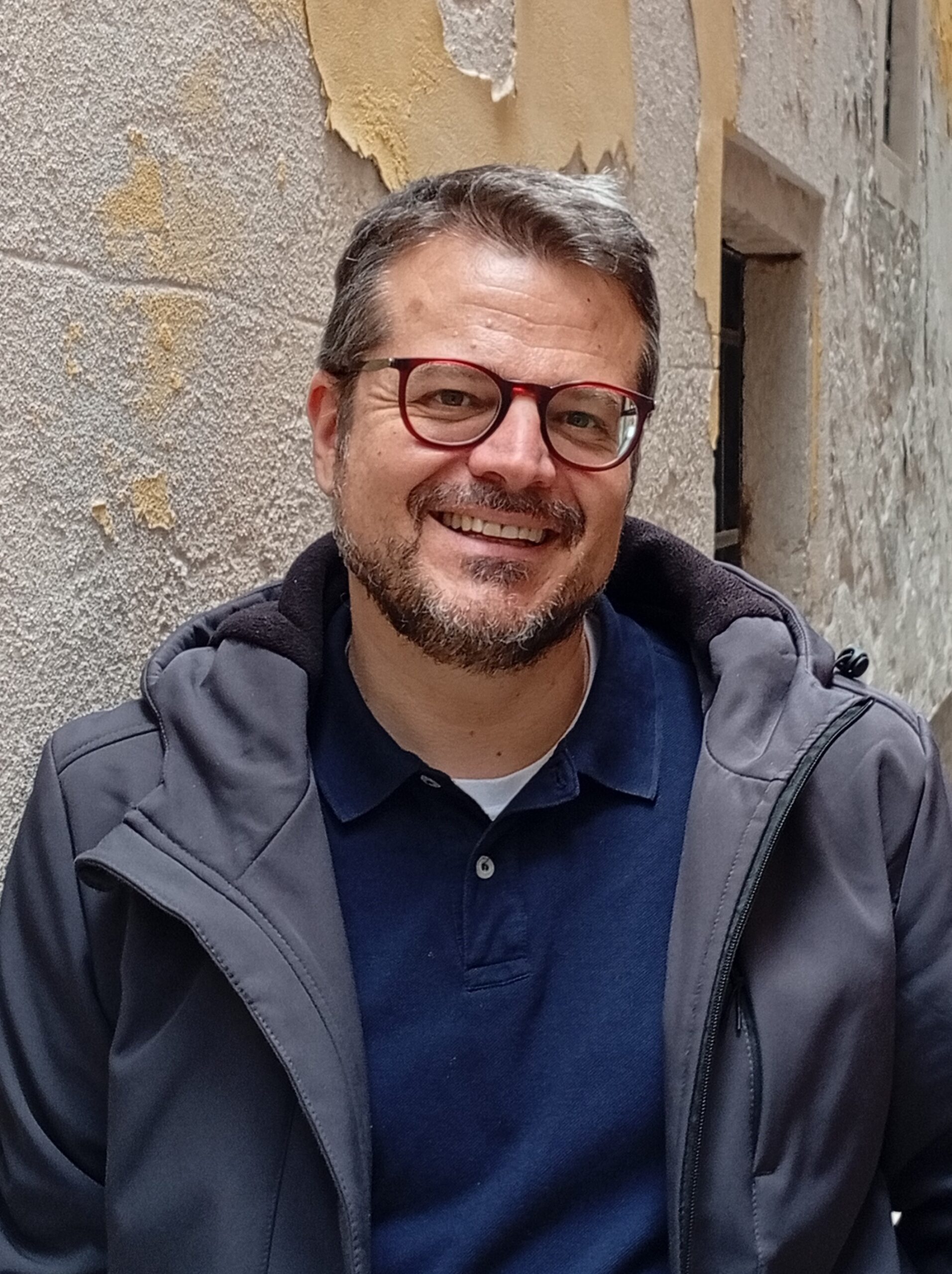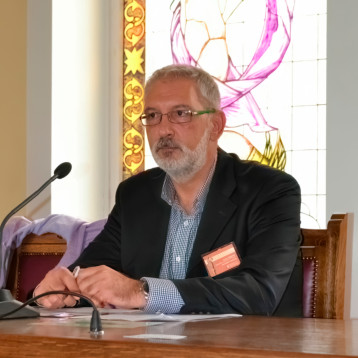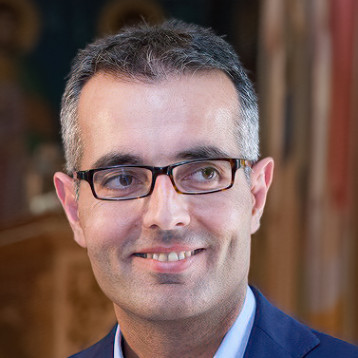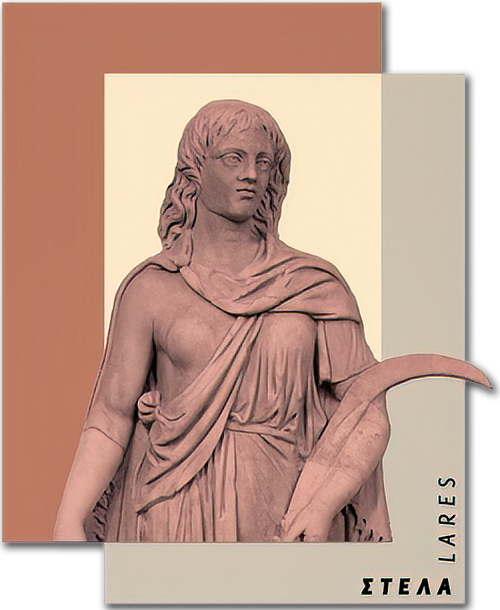ΣΤΕΛΑ/LARES brings together an active and creative community of scholars, researchers, and students united by a shared passion for Latin language and literature and for Roman culture — as well as for their modern reinterpretations.
Our team gathers people with diverse research backgrounds and academic perspectives who converge in a common field of dialogue: the renewal of Latin literary studies through contemporary theoretical approaches, comparative outlooks, and cross-cultural inquiry. Through collaboration, the exchange of ideas, and the encouragement of open thought, the members of the Laboratory actively contribute to the advancement and dissemination of knowledge, while enriching the educational process with innovation, intellectual curiosity, and academic sensitivity.
The Laboratory is always open to new collaborations and initiatives, fostering a fertile environment for research, teaching, and creativity.
Our Team

Charilaos N. Michalopoulos
Associate Professor of Latin
Director of ΣΤΕΛΑ/LARES
Associate Professor of Latin
Director of ΣΤΕΛΑ/LARES
Charilaos N. Michalopoulos is Associate Professor of Latin in the Department of Humanities at Democritus University of Thrace. He studied Classics at Aristotle University of Thessaloniki (BA in Classics, Byzantine & Modern Greek, and Linguistics, 2001) and at the University of Leeds (MA Latin, 2002; Ph.D. Latin, 2006). His research interests focus primarily on Ovid, Roman Epigram, Ecocriticism in Latin poetry, and the Modern Greek reception of Latin literature. He is the author of Myth, Language and Gender in the Corpus Priapeorum (Athens, 2014) and co-author, with V. Vaiopoulos and A.N. Michalopoulos of Ovid, Heroides (1-15). Introduction, Text, Translation, Commentary (Athens, 2021). He has published widely on the Corpus Priapeorum, gender in Roman elegy, and Ovid’s Heroides. He is actively engaged in the translation of Latin poetry into Modern Greek. Current research activity includes articles and a forthcoming monograph on the intersection of ecocriticism and Augustan poetry. He is member of the New Curriculum Team for Latin in Greek secondary education and an associate member of EuGeStA, the European network on Gender Studies in Antiquity. Corpus Priapeorum (2014), ενώ, πιο πρόσφατα, σε συνεργασία με τους Βάιο Βαϊόπουλο και Ανδρέα Μιχαλόπουλο, εξέδωσε την πρώτη νεοελληνική μετάφραση με εισαγωγή, κείμενο, μετάφραση και σχόλια των Ηρωίδων 1-15 του Οβιδίου(2021). Στα ερευνητικά του ενδιαφέροντα συγκαταλέγονται η αυγούστεια ποίηση (κυρίως ο Οβίδιος), το ρωμαϊκό επίγραμμα, η οικοκριτική, η πρόσληψη της λατινικής λογοτεχνίας στα νεοελληνικά γράμματα. Είναι μέλος της Ομάδας Εκπόνησης του Νέου Προγράμματος Σπουδών για το μάθημα των Λατινικών στο Λύκειο, καθώς και συνεργάτης του Ευρωπαϊκού Δικτύου για τις Έμφυλες Σπουδές στην Αρχαιότητα (EuGeStA). Παράλληλα, ασχολείται ενεργά με την ποίηση, τη λογοτεχνική μετάφραση έργων της λατινικής λογοτεχνίας στη νέα ελληνική και τη βιβλιοκριτική.

Ioannis Deligiannis
Professor of Latin
Professor of Latin
Ioannis Deligiannis is Professor of Latin in the Department of Humanities at Democritus University of Thrace. He studied Classics at the University of Athens before undertaking postgraduate studies at University College London, where he specialised in Greek and Latin Palaeography, Codicology, and Textual Criticism. He went on to complete his Doctorate in Latin Philology at the University of Cambridge. He taught Greek and Latin as a Lecturer at University College Cork in Ireland and, from 2009 to 2014, was a Researcher at the Research Centre for Greek and Latin Literature of the Academy of Athens. Since July 2014, he has been a member of Democritus University of Thrace. He is the author of several monographs, including: i) Fifteenth-Century Latin Translations of Lucian’s Essay on Slander (2006), ii) M. Tullius Cicero, On the Republic, Six Books: Introduction, Text, Translation, Commentary (2015), iii) M. Tullius Cicero, On the Laws, Three Books: Introduction, Text, Translation, Commentary (2017), iv) M. Tullius Cicero, On the Republic & On the Laws (2021), v) M. Tullius Cicero, Speeches of Thanksgiving on His Return before the Senate & to the Roman Citizens. Appendix: [M. Tullius Cicero] The Speech of the Day before the Exile: Introduction, Text, Translation, Interpretative Commentary (2021), vi) Herodoti Historia per Matthiam Palmierum Pisanum e Graeco in Latinum versa: The Latin Translation of Herodotus’ Histories by Mattia Palmieri (2025). In collaboration with K. Sp. Staikos, he has also published Aldus Manutius’ Prefaces to the Complete Works of Aristotle (1495–1498) (2019). He has edited a number of academic volumes, among them: i) Investigating the Translation Process in Humanistic Latin Translations of Greek Texts: Proceedings of an International Conference, Democritus University of Thrace, Komotini, 28–29 April 2017 (2017), ii) Cicero in Greece, Greece in Cicero: Aspects of Reciprocal Reception from Classical Antiquity to Byzantium and Modern Greece (2024). In addition, together with colleagues, he has co-edited: i) Identities: Language and Literature. Proceedings of the International Conference Celebrating 20 Years of the Department of Greek Philology, Democritus University of Thrace, Vols. A–B (2017–2018), ii) Post-Byzantine Latinitas: Latin in Post-Byzantine Scholarship (15th–19th Centuries) (2020). He has contributed articles to international journals and conference proceedings, written numerous book reviews, and delivered papers at international conferences, university seminars, and other scholarly events.

Anna Mastrogianni
Assistant Professor of Latin
Assistant Professor of Latin
Anna Mastrogianni is Assistant Professor of Latin Philology in the Department of Humanities at Democritus University of Thrace. She holds a BA in Classical Philology from the School of Philosophy of Aristotle University of Thessaloniki and a PhD from the University of Hamburg. She has held research and teaching positions at the Universities of Hamburg and Greifswald in Germany, and at the University of Cambridge in the United Kingdom. In 2006 she joined the Department of Greek Philology at Democritus University of Thrace, initially as a lecturer and, since 2015, as an Assistant Professor of Latin Philology, where she teaches a wide range of authors and literary genres of classical Latin and Neo-Latin literature. Her research interests focus on classical Latin historiography and rhetoric, as well as on the reception of classical literature during the Renaissance. Within this framework, she has particularly studied the works of the Italian humanists Pietro Crinito, Angelo Poliziano, and Ciriaco d’Ancona.

George Paraskeviotis
Assistant Professor of Latin
Assistant Professor of Latin
Georgios C. Paraskeviotis is Assistant Professor of Latin Philology at the Department of Humanities of Democritus University of Thrace (Komotini, Greece). He was born in Orestiada and studied Classical Philology at Democritus University of Thrace and the University of Leeds (M.A. and PhD in Latin). He has taught Latin language and literature at the Department of Classics at the University of Leeds, the Department of Philology at the University of Patras and the Department of Classics and Philosophy at the University of Cyprus. His research interests include Latin Pastoral Poetry, Augustan Poetry (especially Vergil), Roman Comedy, Roman Satire, and more recently, the role of humour in Latin literature.

Artemis Archontogeorgi
Post-Doc Researcher in Latin
Post-Doc Researcher in Latin
Artemisia Archontogeorgi is a permanent teacher at the Minority Junior High and High School of Komotini and a Postdoctoral Researcher in Latin Literature at the Department of Humanities, Democritus University of Thrace. She studied Classical Philology at the National and Kapodistrian University of Athens (1994) and pursued postgraduate studies in Latin Literature at the Department of Greek Philology, Democritus University of Thrace, where she earned her MA (2014) and PhD (2020). She has participated in national and international conferences and has published articles on various aspects of Latin literature. Her research interests include Augustan poetry −particularly Roman love elegy− as well as the theory of emotion, ecocriticism, ecofeminism, digital humanities, and the reception of Latin literature in Modern Greek letters. She has been an active member of research teams for the projects “Ecocritical Issues in Latin Literature: Nature and Humanity in the Thought, Language, and Literature of the Augustan Age” (MIS: 5048129) and “Mythological Routes in Eastern Macedonia and Thrace (MYTHOTOPIA)” (MIS: 5047101). Recently, she served as a trainer for the New Curriculum for Latin in Greek high schools. During the past three academic years (2022-2025), she has been seconded to the Department of Greek Philology at the Democritus University of Thrace.
